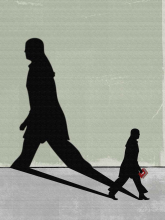Belief

Americans voted largely along the lines of race, education, and party identification. Nonwhites strongly preferred Clinton, while whites decisively chose Trump. Compared with past Republicans, the businessman received a stunning surge of votes from non-college-educated white voters.
None of this is surprising.
And yet the result upends so much conventional wisdom.

People need to believe in something, or someone, or Someone.
This human need to believe is a very powerful force. It can overcome a great deal of countervailing evidence. One place this is obvious is in politics.
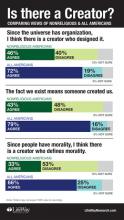
You don’t have to believe in God or identify with any religion to see a creator’s hand in human life and morality, suggests a new survey.
LifeWay Research’s overall finding — that most Americans believe there is a creator who designed the universe and defines human morality — is not surprising. After all, 3 in 4 U.S. adults identify with a religious denomination.
The surprise is that so many people who don’t identify with a religion — so-called nones — agree.
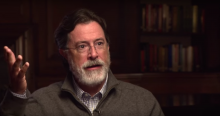
In a sneak peek at an upcoming interview, Stephen Colbert discusses his faith with surprising frankness.
The new host of Late Night sat down with Father Thomas Rosica, media attaché to the Holy See Press Office and CEO of Salt and Light Television.
The Daily Beast, which got a preview, writes that, "[t]he extensive exclusive interview, which is at times hysterically funny and profoundly serious, airs in full on Rosica's interview program Witness on Sept. 13."

What I am learning is that the new normal is not that I no longer experience God, but that God is meeting me in new ways. The new normal is that I don’t need to hear people play guitar telling me to feel God’s love from a stage. I find God’s love in much less conspicuous places, from the stranger behind me who felt too awkward to shake my hand, to the silly doodles my kids were making on the church bulletin. The new normal is that I no longer find authority in celebrity pastors preaching at me, but I do find it listening to unheard voices of small bloggers and older people who aren’t social media savvy.
The new normal is that I hear the "Roman Road" gospel preached and find it dull and superficial, and yet feel overwhelming conviction in the cross lived out by people who forgive their enemies.
The new normal is that although God has not changed, I have changed. And like a parent who stops cooing in baby talk, God is starting to speak in new, fresh ways to me.

I’ll never forget that conversation: the moment Amy predicted I would walk away from my faith. I was 26 at the time. She, 36. We sat at a rustic seafood restaurant on the beach. I stabbed my blacked salmon salad and chewed long and hard on her words.
“You remind me of myself 10 years ago,” she said.
She had been raised in a deeply religious family, and had been a devout Jew her whole life. Then around her 20s, she gave it all up. By the time I met her in her 30s, she called herself a “lapsed Jew,” disillusioned with the rules, the expectations, the rigorous doctrines.
I was the daughter of missionaries, raised in the Evangelical church, and deeply committed to my relationship with Jesus. Her words scared me. No, no, I prayed quietly. Jesus please don’t let me go.
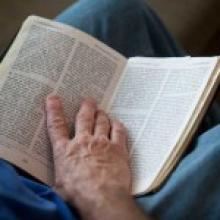
It is a tradition in American journalism as predictable as Easter and Christmas itself: a cover story purporting to reveal the true story behind the Bible we thought we knew. Newsweek — now in its digital-only form — offers the latest entry in this genre with “The Bible: So Misunderstood It’s a Sin,” written by Vanity Fair contributing editor Kurt Eichenwald.
Eichenwald seeks to demonstrate that the Bible is “loaded with contradictions and translation errors and wasn’t written by witnesses and includes words added by unknown scribes to inject Church orthodoxy.” Eichenwald insists his article is not an attack on the Bible or Christianity. Rather, Eichenwald wants to rescue the message of Jesus from “God’s frauds,” those manipulative fundamentalists who don’t read or understand their Bibles but abusively twist it in order to create misery for others.
Even with a generous 8,487 words, Eichenwald reveals he is out of his depth for this subject matter. Though he doggedly advances his predetermined thesis from a mishmash of angles, experts quickly showed online that Eichenwald has not really done his historical homework or read his Bible carefully.

There is a line in the famous movie Ben Hur in which one of his relatives goes to hear Jesus speak. She comes back enthralled. The way she describes Jesus is by saying that he is like no one she has ever met before, that he speaks words of life. And so he did. The Gospel writers add that he spoke as one who had authority. The Message version interprets this as meaning he lived out what he spoke.
Our lives have the most impact when we live what we speak. Jesus of course is the perfect example of this. For 2,000 years he has captivated people of all races and colors. There is something about this man that is like no other. He speaks words of life and he lived those same words. He loved his enemies, he walked the extra mile, he denied himself, took up his cross and lived a life of obedience to the Father.
Our lives speak, whether we like it or not, and whether we think so or not. We are either speaking life or we are speaking death. We all have a worldview.
OURS IS A CHRISTIAN FAMILY STORY. It is also a loving, loyal, confused church story. There’s nothing all that unusual about it, really. But precisely because similar stories are unfolding in countless families and churches today, I want to share it.
I want you to see how sexual orientation and deeply held beliefs are at odds in ways that injure those we love. This debate is not simply about beliefs and rights; it’s about people who are created in God’s image. Those people may be like you or entirely unlike you. They may be your roommate or neighbor, your best friend or a colleague. They may be your son or daughter.
My dad would later tell me the day I came out to him was the worst day of his life. His sister had passed away the year before; his father years earlier. But the day I said “Dad, I’m gay” was the worst day of his life. To his credit, though, he didn’t tell me that at the time. He hugged me and listened as I nervously stumbled over my words for an hour and a half. Then he told me he loved me.
My mom, too, responded with open arms, but the news was hard for her to hear. She could barely eat for several days afterward, and she spent much of the next year deeply dispirited. Still, I was grateful for my parents’ unfailing compassion and love.
What that love would ultimately look like, though, was unclear.

Like many people, I was troubled when I heard about the recent shooting outside of a Jewish community center in Overland Park, Kansas. According to several news accounts, the perpetrator — Frazier Glenn Cross — yelled, “Heil Hitler” at onlookers as he was being carried away in a police car. Cross also has a long history of anti-Semitic behavior and has publically declared a hatred of all Jews.
In addition to being troubled by this act of hatred and violence, I was also troubled by the quick response of CNN Belief Blog Co-Editor, Daniel Burke, who made it a point to emphasize that Frazier was not a Christian but rather allegedly an adherent of Odinism, a “neo-pagan” religion which, according to Burke, “has emerged as one the most vicious strains in the white supremacist movement.”
While the annals of Christian history — ancient and modern — are full of accounts of violence perpetrated in the name of Christianity, my objective here is neither to defend Odinism nor to criticize Christianity. Instead, I want to highlight the socially constructed nature of beliefs and beliefs systems and emphasize how these socially constructed beliefs say far more about us than they do about the “gods” we claim to accept or reject.

“On the third day, he rose again.”
But how that statement is interpreted is the source of some of the deepest rifts in Christianity — and a stumbling block for some Christians and more than a few skeptics.
Did Jesus literally rise from the dead in a bodily resurrection, as many traditionalist and conservative Christians believe? Or was his rising a symbolic one, a restoration of his spirit of love and compassion to the world, as members of some more liberal brands of Christianity hold?

Easter Sunday marks the holiest, most exalted moment of the Christian year. In Easter services all over the world, trumpets and organs blast. Flowers transform churches with their brightness. Worship leaders boldly proclaim: “Christ is risen!” Congregations echo back: “Christ is risen indeed!” The cycle of celebration and repetition begins as it should — a festive proclamation of good news. In Christ God has overcome the powers of sin and death, freeing us to live with hope and promising us life. Not just life after death, but full life, divinely inspired life — life in the here and now.
Christ is risen! Christ is risen indeed!
Even in these festive moments, many people express insecurity regarding the quality of their own believing.

I get asked questions sometimes that I feel are useful for a larger audience to consider and discuss. One such question was submitted to me by a reader a while back, which echoes the sentiments within many other similar questions I’ve received. Here’s the essence at the heart of those questions.
What do I do if I’m not sure what I believe?
First of all, don’t freak out. Most of the book of Ecclesiastes in the Old Testament is about a priest suffering a crisis of faith. And though some argue it was more a fulfillment of prophecy (quoting a psalm) rather than a personal cry of distress, it’s hard not to feel Jesus’ own existential suffering when he cries out from the cross for a God who seems to be missing.

“Belief is as hard as a hickory nut
that cracked holds many mansions.”
—Pat Schneider
If my belief were a hickory nut
I’d keep it safe in my pocket
easy to find with fumbling fingers.
When challenged
I’d take it out
say here, see this.
This is what I believe.

For some months now, I have been ruminating on the writer John Podhoretz’s eulogy in Commentary magazine for his sister Rachel Abrams upon her death, from stomach cancer, at age 62. Commentary effectively being the Podhoretz family house organ, and the Podhoretzes effectively being the mythological family of the origin of neoconservatism, the essay would be of interest to anyone interested in cultural and religious sociology — or at least to me.
I, too, come from a family that has also tended to think of itself in somewhat mythological, contrarian terms — This is what Langstons are like — so a meditation from the heart of another large, bustling family is an immediate and natural draw for me.
But lay that all aside. The eulogy wins, and haunts, because it is the passionate remembrance of a sister by her brother. Despite their being part of a prominent East Coast family, its focus is relentlessly on the small acts of family and home that transfigure quotidian existence. Podhoretz dwells lovingly on Rachel as a housewife, a lifetime foul-mouth, an exuberant and dedicated mother, an artist, and finally a writer who let loose with political commentary in her late fifties as online blogs began gathering steam.
“I loved you, Rachel,” he concludes poignantly, in words I could read over and over. “I liked you. And oh, oh, oh, how I admired you.”
So much of that poignancy is derived from direct address to his sister, who is no longer there to receive it. Having just hit 45, Dante comes to mind: midway-through-the-journey-of-our-life-I found myself within a dark wood for the right way had been lost. Who can know how our days are numbered? The lesson for me is that I should tell of how I love my brother John, even as he lives.

A new study of almost a century’s worth of data shows that the smarter you are, the less likely you are to believe in God.
The study, conducted by Miron Zuckerman, a psychologist at the University of Rochester, examined the findings of 63 earlier studies — one dating back to the 1920s — that measured intelligence and religiosity. The majority of those studies found that more intelligent people were more likely to lack religious beliefs.
“The relation between intelligence and religion is negative,” Zuckerman said. “It was very early in the study that we realized that.”
But Zuckerman is careful to point out that his work — known as a “meta-study” because it examines a range of other studies — does not mean only dumb people believe in God.
Rather, he said, it shows only that more intelligent people may have less need for religion.

Uncertainty about the existence of God is not the same thing as certainty about the non-existence of God.
I’ve enjoyed taking part in the “Subverting the Norm” conference this weekend with many of the forefront thinkers in what has been called “Radical Theology.” Although the word “radical” has sensationalist connotations for lots of people, it really just means a theology that isn’t firmly rooted. I know that in itself sounds scary to some folks, but the radical theology camp might suggest that fear stems from an addiction to certainty.
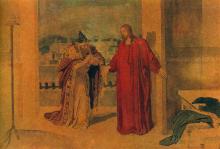
He came to Jesus at night, sneaking off to see the man behind the miracles.
He was a powerful Pharisee, a member of the Sanhedrin, the Jewish ruling council. He wasn’t supposed to mix with the motley lot that followed Jesus.
But Nicodemus had to know: Was the charismatic Galilean for real?

SALT LAKE CITY — For years, Matt Duff was an uber-Mormon.
At 17, he ran away from home and moved in with the only black Latter-day Saints family in his New England town.
Two weeks shy of his 18th birthday, he joined the Utah-based Church of Jesus Christ of Latter-day Saints.
By 19, he was on a Mormon mission in Denver, and two years later he enrolled at Brigham Young University-Idaho, where he met his future wife, Kylee, a multigenerational Mormon with a winning smile and a guileless faith. The two married in the Salt Lake LDS Temple.
Eight years and three children later, Matt Duff stopped believing.
